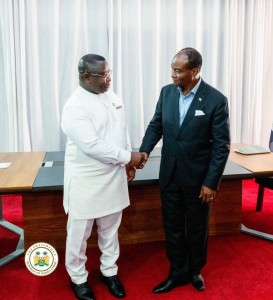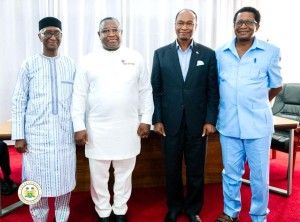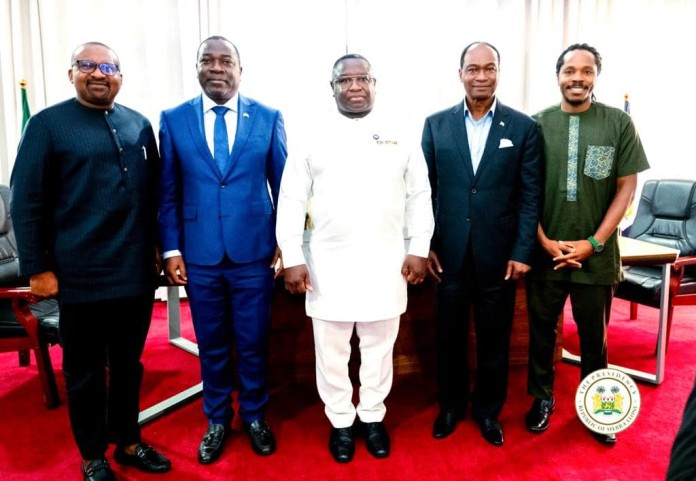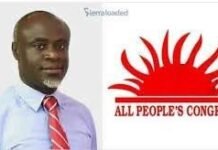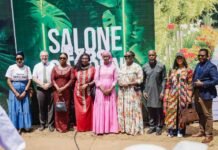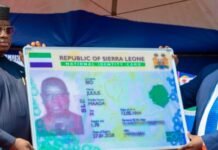By Foday Moriba Conteh
His Excellency President Julius Maada Bio has on the 21st November, 2023 launched the Independent Committee for Electoral Systems Review at State House during an event that was graced by dignitaries, political leaders, representatives, media, Civil Society, and esteemed guests who witnessed a pivotal step towards fortifying Sierra Leone’s democratic foundations.
It must be noted that this development came in the wake of the mediated ‘Agreement for National Unity’ between the Government of Sierra Leone (GoSL) and the All Peoples Congress Party (APC), that took place from October 16-18, 2023 in Freetown and in the process a pivotal resolution was adopted which was to establish a ‘Cross Party Committee on Electoral Systems and Management Bodies Review with a three-way Leadership.
Following the adoption, subsequent engagements between the GoSL and the APC took place and it was agreed that the APC would nominate up to seven members for the Committee, which they did and approved by the President, who emphasized the need for an inclusive representation of stakeholders in addition to the nominated members.
In order to initiate the Committee’s operationalization, President Julius Maada Bio yesterday spearheaded the official launch of the Independent Cross-Party Committee on Electoral Systems and Management Bodies Review.
In his address, President Bio emphasized the nation’s dedication to fortify democratic values, underscoring the collective commitment transcending political and individual differences for the greater national interest. He reflected on the post-election concerns following his 2023 election, highlighting his proposal to establish a National Electoral Systems Review Committee to fortify institutional, legal, and operational frameworks for future elections.
Acknowledging the instrumental role played by inter-party dialogues facilitated by ECOWAS, the African Union, and the Commonwealth, President Bio expressed pride in the adoption of a 7-point resolution for national unity and cohesion. Notably, his proposal for an electoral systems review was embraced as the third resolution, marking a significant step toward reconciling political differences.
The President extended gratitude to opposition leaders, particularly Dr. Samura Kamara, and the Government team led by Dr. David Sengeh, for their commitment during deliberations aimed at fostering national reconciliation. He highlighted the swift implementation of Resolution Number 1, addressing the nation on October 24th, and the subsequent compliance by the main opposition in ending their non-participation in governance as per Resolution Number 2.
(The launch of the tripartite committee for electoral systems and management bodies was heralded as a crucial stride in institutionalizing dialogue within the nation’s political landscape.)
He stressed the importance of political dialogue as a symbol of commitment to peace and national unity, citing past initiatives such as the Independent Commission for Peace and National Cohesion established after the 2018 general elections.
The President affirmed the nation’s democratic growth and resilience in overcoming challenges, expressing satisfaction in collaborating with local and international partners to deepen congeniality in political discourse. He reiterated his Government’s unwavering support for the Committee and pledged full implementation of the remaining resolutions from the dialogue agreement.
In a moment brimming with pride and honor, President Julius Maada Bio officially inaugurated the Independent Three-Way Committee on Electoral Systems and Management Bodies Review, signifying a home-grown initiative poised to fortify Sierra Leone’s democratic landscape.
On his part Dr. Samura Kamara, the Leader of the All People’s Congress (APC), underscored the necessity for a peaceful resolution following the contentious June 24, 2023 multitier elections.
He emphasized the significance of seeking a peaceful resolution amid the stalemate that ensued after the contested elections highlighting the commitment of both parties to finding a peaceful resolution and urged fellow political leaders to prioritize dialogue over conflicts and violence.
Touching upon electoral malpractices and the need for transparency, Dr. Kamara stressed the importance of scrutinizing the electoral processes, particularly in relation to the publication of disaggregated election results. He called for mutual respect and emphasized the complexities in handling political, economic, and governance challenges.
Expressing gratitude to involved parties and development partners for their support, Dr. Kamara emphasized the imperative of jointly agreed terms of reference for the committee. He underscored the need for an in-depth review of electoral procedures, including voter registration, polling, vote counting, and result announcement, to ensure future elections are credible, transparent, and free from irregularities.
The composition and independence of the committee were highlighted as critical factors for its effectiveness. Dr. Kamara affirmed the APC’s selection of members based on integrity, expertise in electoral processes, and patriotic values. He stressed the need for the Committee’s autonomy and access to all pertinent documents and information to execute its duties effectively.
Babatunde A. Ahonsi, the UN Resident Coordinator in Sierra Leone, in his statement maintained that the establishment of the Committee stands as a key provision of the National Unity Agreement inked on October 18, 2023, between the Government and the main opposing party, APC.
He emphasized the paramount importance of promoting unity and national cohesion, particularly following a divisive electoral campaign and the tense post-election period.
The Resident Coordinator lauded the opposition’s return to governance and commended President Bio’s commitment expressed during his national address on October 24, 2023, to prioritize the agreement’s implementation underscoring how the review of the electoral system, as highlighted by the President, holds critical significance in bolstering Sierra Leone’s democratic foundations.
Ahonsi reiterated the United Nations’ unwavering commitment to supporting the agreement’s implementation. Responding to both the President’s and APC’s requests, he said the UN pledges to serve as representatives in the Committee’s tripartite leadership, participate as moral guarantors and provide essential technical assistance for implementing the Committee’s recommendations.
He concluded that in collaboration with development partners and under the leadership of the Special Representative of the Secretary-General for West Africa, the UN’s Department of Political and Peace Building Affairs and Electoral Assistance Division stands prepared to contribute significantly to this crucial process in Sierra Leone.
The composition of the Committee includes: Dr. Kaifala Marah as Co-Chair on the side of the main opposition APC. Other key figures of the APC include Dr. Richard Konteh, Ambassador Alimamy Petito Koroma, Boniface Sidikie Kamara, David Fornah, Bernadette Kargbo, and Prince Tholley.
On the side of the Government, Dr. Emmanuel Giama will serve as Co-Chair and other members include Hon. Dr. Fatmata Hassan, Madam Isatu J. Kabba, Hon. Helen Kuyembeh, Napoleon Koroma, Hon. Alpha Sesay and Rtd. Hon. Justice Komba Kamanda.
Representatives from CSOs include: 1 from IGR ,1 from 50/50 Group ,1 from the Human Right Commission of Sierra Leone ,1 from SLAJ, 1 from the National Council for Civic Education and Democracy.
The Moral Guarantors include: ECOWAS, African Union, Commonwealth, United Nations, ICPNC, Women’s Forum, National Council of Paramount Chiefs, Sierra Leone Labour Congress, Children Forum Network, District Youth Representatives and the Inter-Religious Council of Sierra Leone.
